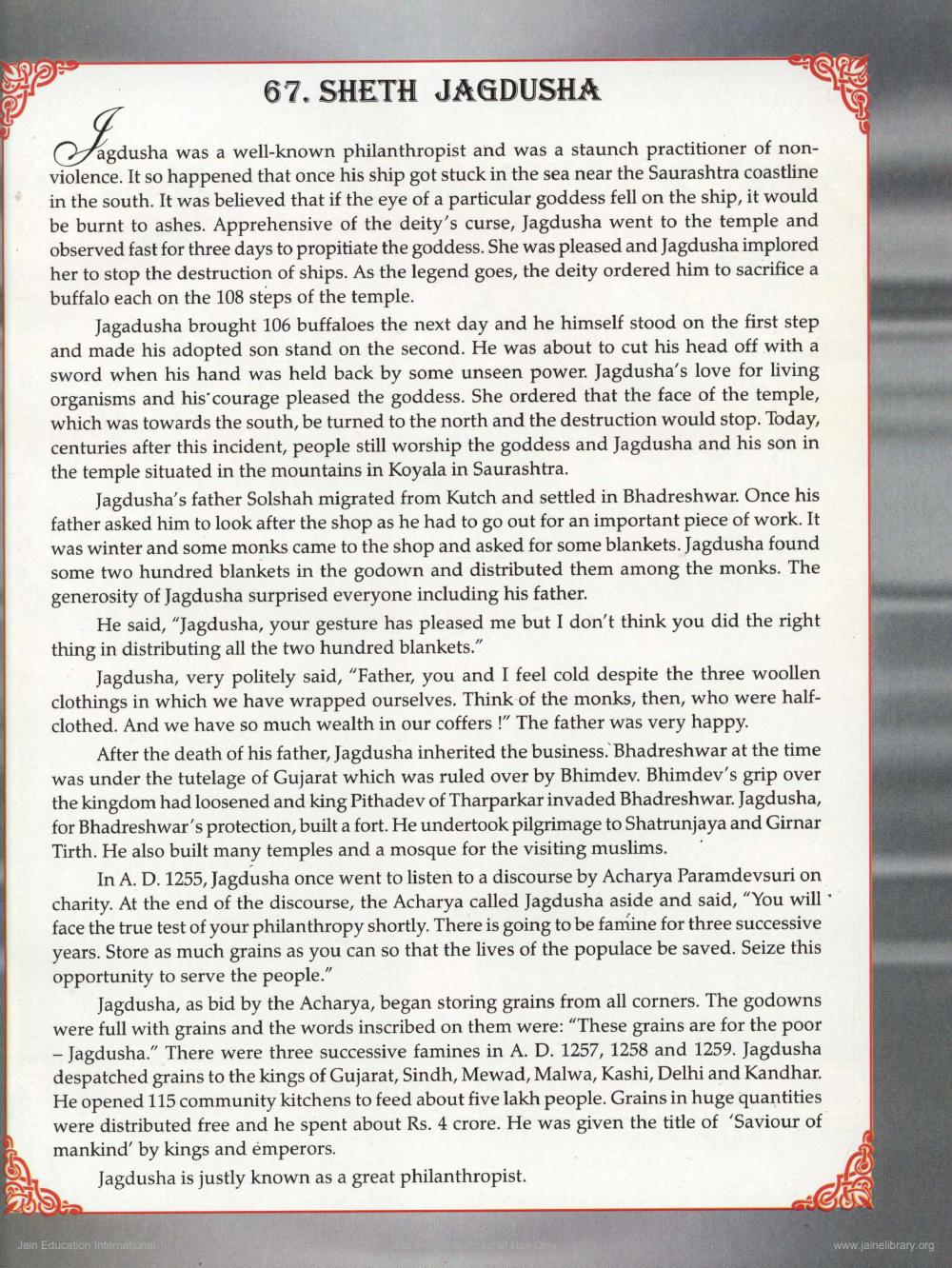________________
67. SHETH JAGDUSHA
Jagdusha
gdusha was a well-known philanthropist and was a staunch practitioner of nonviolence. It so happened that once his ship got stuck in the sea near the Saurashtra coastline in the south. It was believed that if the eye of a particular goddess fell on the ship, it would be burnt to ashes. Apprehensive of the deity's curse, Jagdusha went to the temple and observed fast for three days to propitiate the goddess. She was pleased and Jagdusha implored her to stop the destruction of ships. As the legend goes, the deity ordered him to sacrifice a buffalo each on the 108 steps of the temple.
Jagadusha brought 106 buffaloes the next day and he himself stood on the first step. and made his adopted son stand on the second. He was about to cut his head off with at sword when his hand was held back by some unseen power. Jagdusha's love for living organisms and his'courage pleased the goddess. She ordered that the face of the temple, which was towards the south, be turned to the north and the destruction would stop. Today, centuries after this incident, people still worship the goddess and Jagdusha and his son in the temple situated in the mountains in Koyala in Saurashtra.
Jagdusha's father Solshah migrated from Kutch and settled in Bhadreshwar. Once his father asked him to look after the shop as he had to go out for an important piece of work. It was winter and some monks came to the shop and asked for some blankets. Jagdusha found some two hundred blankets in the godown and distributed them among the monks. The generosity of Jagdusha surprised everyone including his father.
He said, "Jagdusha, your gesture has pleased me but I don't think you did the right thing in distributing all the two hundred blankets."
Jagdusha, very politely said, "Father, you and I feel cold despite the three woollen clothings in which we have wrapped ourselves. Think of the monks, then, who were halfclothed. And we have so much wealth in our coffers!" The father was very happy.
After the death of his father, Jagdusha inherited the business. Bhadreshwar at the time was under the tutelage of Gujarat which was ruled over by Bhimdev. Bhimdev's grip over the kingdom had loosened and king Pithadev of Tharparkar invaded Bhadreshwar. Jagdusha, for Bhadreshwar's protection, built a fort. He undertook pilgrimage to Shatrunjaya and Girnar Tirth. He also built many temples and a mosque for the visiting muslims.
In A. D. 1255, Jagdusha once went to listen to a discourse by Acharya Paramdevsuri on charity. At the end of the discourse, the Acharya called Jagdusha aside and said, "You will face the true test of your philanthropy shortly. There is going to be famine for three successive years. Store as much grains as you can so that the lives of the populace be saved. Seize this opportunity to serve the people."
Jagdusha, as bid by the Acharya, began storing grains from all corners. The godowns. were full with grains and the words inscribed on them were: "These grains are for the poor - Jagdusha." There were three successive famines in A. D. 1257, 1258 and 1259. Jagdusha despatched grains to the kings of Gujarat, Sindh, Mewad, Malwa, Kashi, Delhi and Kandhar. He opened 115 community kitchens to feed about five lakh people. Grains in huge quantities. were distributed free and he spent about Rs. 4 crore. He was given the title of 'Saviour of mankind' by kings and emperors.
Jagdusha is justly known as a great philanthropist.
Jain Education International
www.jainelibrary.org




